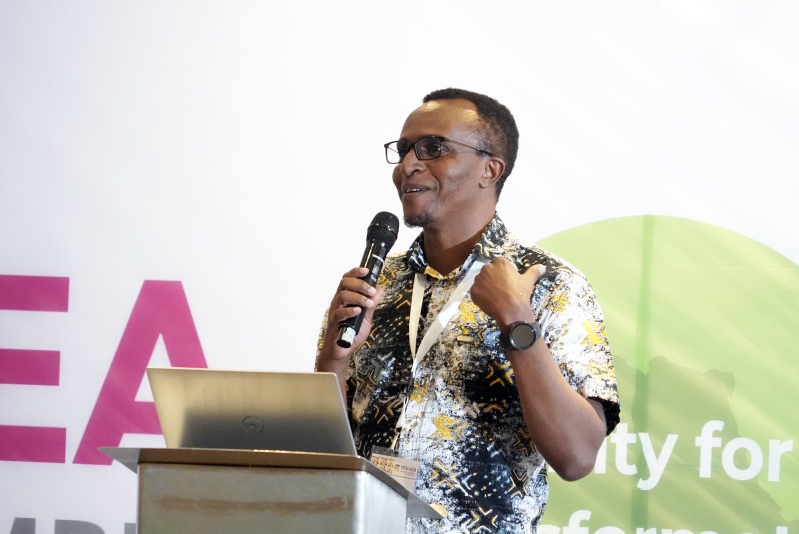
At the 13th AEA General Assembly gathering on May 21, Joel Macharia, Director of Compassion International Kenya, delivered an in-depth speech on the status of children in Africa. In his address, Macharia highlighted the pressing challenges facing children across the continent, particularly those living in conflict zones.
He called for a united effort from faith communities, governments, and organizations to address these issues, stressing the need for collective action to ensure a safer and more prosperous future for Africa's most vulnerable youth.
Macharia opened his presentation by highlighting Africa’s status as the world’s youngest continent. "Africa is the youngest continent," he stated, noting that nearly 600 million children across the continent are under the age of 18.
"Africa’s future lies in its youth, and as future leaders, they need our attention and care." This demographic reality, however, is not without its challenges. Macharia continued, stressing that many of these children live in environments plagued by poverty, conflict, and instability, where the basic necessity of survival takes precedence over education and spiritual development.
The focus of Macharia's address quickly shifted to the profound risks that children in conflict zones face. "Children in conflict zones are exposed to extreme risks—violence, exploitation, and abuse," he explained. These children, Macharia said, are often subjected to trauma from a very young age.
"In these regions, survival becomes their primary focus," he said, reflecting on the traumatic impact that such environments have on children’s physical and emotional well-being. "Children are not thinking about their future; they are focused on surviving from one day to the next."
In conflict areas the focus is entirely on survival
He emphasized that, while the immediate risks of violence are grave, the long-term consequences of conflict are equally devastating. The lack of stable environments for these children, particularly in terms of education and emotional support, sets them on a path to even more profound challenges as they grow older.
Macharia pointed out that in many conflict areas, the focus is entirely on survival, with little to no opportunity for children to think about their future or develop a sense of hope.
As Macharia continued, he outlined the urgent need for child protection and safeguarding measures. The growing number of children in crisis situations is staggering, but the lack of adequate systems in place to protect them is even more alarming.
"The problem is not just the immediate dangers that children face in these regions," he said. "It’s the lack of sustainable support systems that leave children in vulnerable positions well after the immediate conflict ends." He advocated for long-term solutions that involve the protection and rehabilitation of children within family-based care systems.
"Children need stable homes, not institutions," he said, calling for the implementation of effective child protection frameworks to safeguard children against abuse and neglect, particularly those in the most vulnerable situations.
Children are not just the church of tomorrow; they are the church of today
Macharia also addressed the issue of child evangelism, which he described as one of the most neglected areas in many African churches. "There is a significant demographic of young people in Africa who are largely neglected when it comes to the propagation of the Gospel," he stated. "If we are to raise future generations who will bring about positive change, we must reach them with the Good News while they are still young."
Macharia’s comments were a call to action for churches, urging them to shift their focus toward youth evangelism and discipleship. "Children are not just the church of tomorrow; they are the church of today," he asserted. By investing in the spiritual formation of children, Macharia argued, churches can have a transformative impact on the next generation of leaders and advocates for social change.
Many children, Macharia pointed out, are growing up in environments where they are exposed to a wide array of challenges, including poverty, neglect, and trauma. Without a strong foundation in their faith, these children may struggle to cope with the hardships they face.
"Evangelism for children is not just about introducing them to Christ; it’s about building them up, providing them with the spiritual and emotional tools they need to navigate their world and grow into healthy, responsible adults."
His comments reflect a broader concern in the Christian community regarding the importance of child evangelism and discipleship. In many parts of Africa, churches focus on adult congregants, often neglecting the spiritual formation of children.
Lack of support systems and the absence of adequate care structures for orphans
The topic of orphans in Africa, many of whom have lost their parents due to HIV/AIDS, conflict, and other causes, was also central to Macharia’s address. According to Macharia, there are currently around 52 million orphans across the continent.
He shared stories from his experience working with vulnerable families, including one instance where a grandmother was caring for a large number of orphaned grandchildren. Despite the overwhelming challenges of raising so many children in a difficult environment, Macharia was struck by the grandmother's unwavering faith. When he asked her how she is able to take care of all these children she replied, 'God provides for us our daily bread,' and her faith, even in such dire circumstances, was incredibly moving," he reflected.
Macharia noted that while organizations like Compassion International are working tirelessly to improve the lives of orphans and other vulnerable children, the scale of the need is immense. "The need is so vast," he said, "and the challenges are so great. While we are making progress, it’s clear that more must be done to address the systemic issues that leave so many children in peril."
Addressing the pervasive issue of child abuse and exploitation, Macharia shared that the perpetrators of these crimes are often people in positions of trust—family members, community leaders, and others who have access to vulnerable children.
"In Africa, sexual abuse, especially of girls, is a major issue," Macharia stated. "Fathers, uncles, and grandfathers are often the perpetrators, and families are reluctant to report these crimes because of the shame it brings to the family."
He discussed the importance of creating safe spaces where children can feel protected, heard, and supported. "It is vital that children have a place where they can speak freely, be heard, and feel safe from harm," Macharia stressed. He highlighted the role the church can play in providing such spaces and becoming a guiding light in the fight against abuse.
"The church must stand as a beacon of truth, calling out the evil of abuse and protecting the vulnerable," he said.
Many cultures are hiding child abuse to protect family's name
Macharia’s comments reflected a deep concern about the cultural factors that often allow abuse to continue. In many African cultures, shame plays a significant role in preventing families from acknowledging abuse.
"In many cultures, families will hide the abuse because they don’t want to bring dishonor to their name," he said. "But we cannot let cultural taboos protect perpetrators of violence. The church has to be bold in speaking out and advocating for justice."
He also raised concerns about the barriers to justice faced by many children. "Sometimes even law enforcers don’t see abuse as a serious issue," Macharia said. "They have become desensitized to it because they see it so often. This apathy is dangerous, and it only allows the abuse to continue."
"Every child needs a champion"
To address these issues, Macharia called for more resources to be directed toward training church leaders and workers to identify, prevent, and respond to child abuse. He suggested that creating a culture of child protection within churches, where children are valued and their well-being is a priority, is crucial.
"Every child needs a champion," he said. "Every child needs an anchor. You can be that anchor for a child. If you show love and care, they will see Christ in you."
While Macharia emphasized the scale of the challenges facing children in Africa, he also expressed hope that change is possible.
"We may not be able to solve every problem," he said, "but we can make a difference in the life of at least one child." He urged individuals to take personal responsibility for the welfare of children in their communities, emphasizing that every small act of kindness can have a ripple effect.
"The need is huge, but it’s not an excuse to do nothing," he said. "Whether it’s through prayer, advocacy, or volunteering with organizations that support children, we can all contribute to improving the lives of children in Africa."






